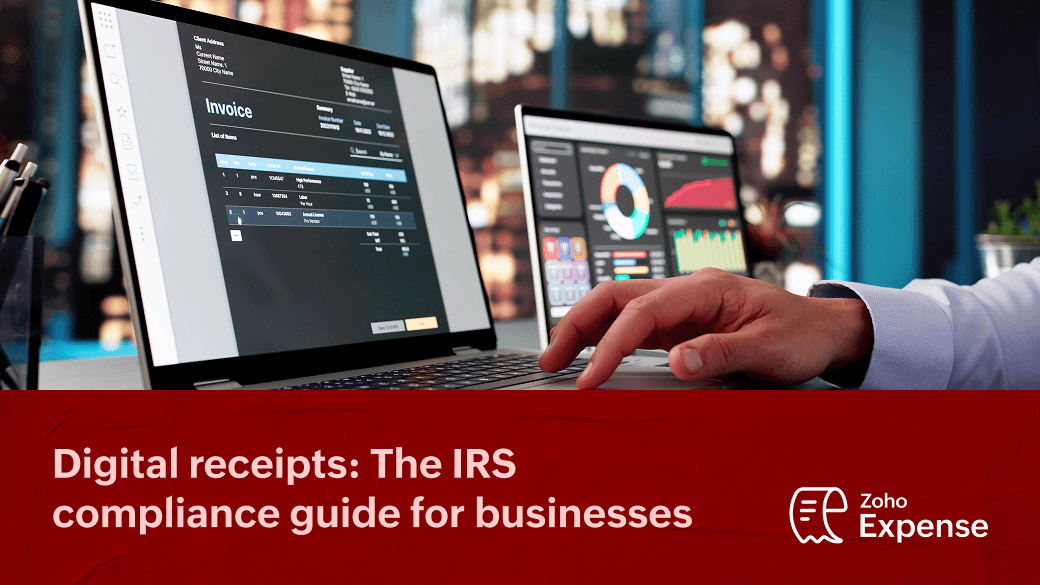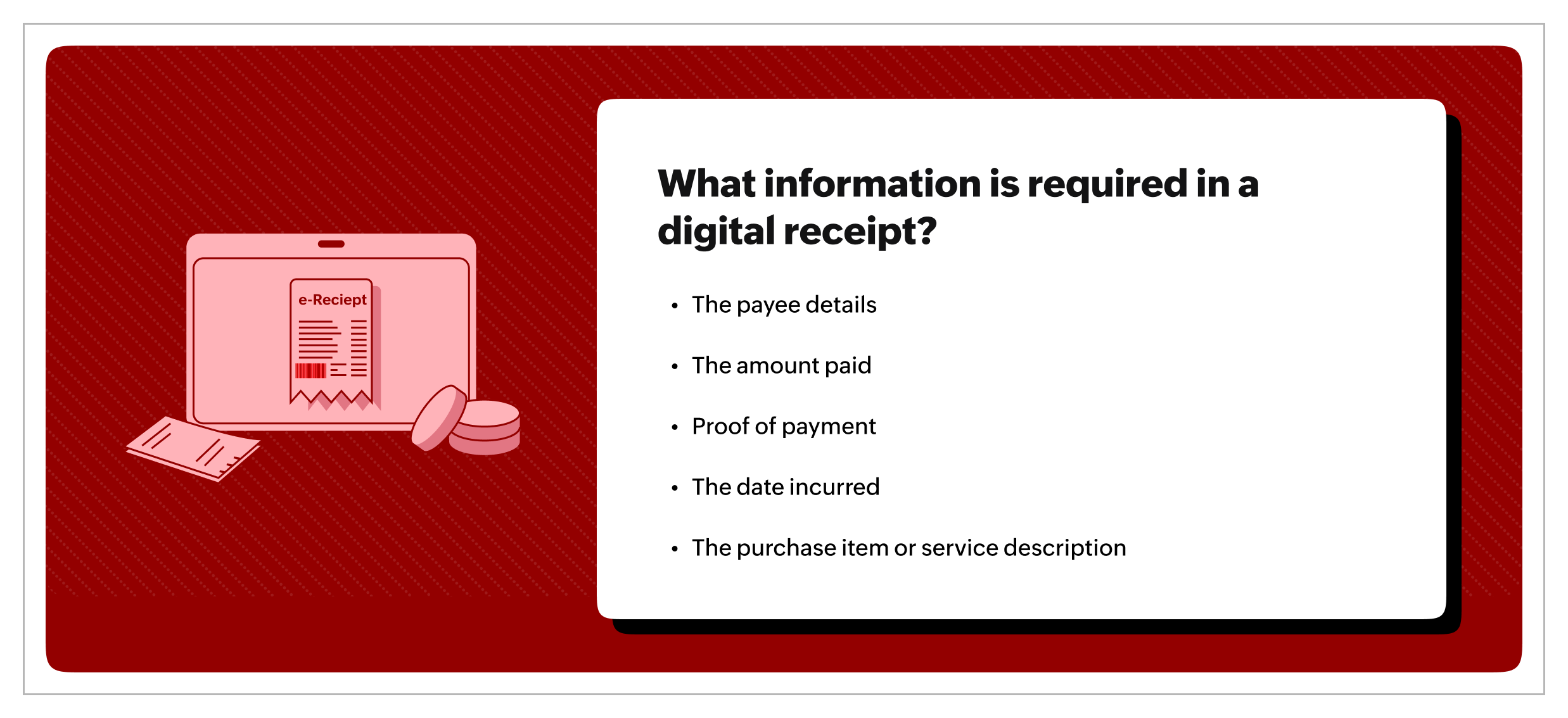- HOME
- Expense Management
- Digital receipts IRS requirements 2025: Complete compliance guide for businesses
Digital receipts IRS requirements 2025: Complete compliance guide for businesses
The Internal Revenue Service (IRS) is the federal authority that regulates taxes for US businesses and individuals. As businesses manage accounting, finances, and tax filing digitally, the IRS has laid down rules regarding digital document storage for all supporting documents, including expense receipts. This guide will take you through the specified conditions, limits, and constraints for digital receipt storage.

What are digital receipts?
Electronic copies of purchase receipts are called digital receipts. Digital receipts, also known as eReceipts, are shared by vendors via emails, messages, or in applications. With the need for eco-friendly options increasing, many major organizations and consumer brands now issue digital receipts, while providing printed receipts as an option. Following the trend, most governments across the world have created provisions for digital receipt storage and use for business and personal tax purposes.
With the advent of advanced security in technology such as blockchain and NFT, many organizations are now exploring ways to strengthen the security of issued receipts, especially as AI-generated receipts gain traction in the market.

IRS digital receipt acceptance criteria (2025 updates)
The IRS's Revenue Procedure 97-22, published in 1997, clearly establishes the guidelines to maintain books and records using an electronic storage system. The IRS allows businesses to maintain electronic records of all supporting documents.
What is an electronic record?
The IRS defines electronic records as any information that is recorded in a form that only a computer can process. This includes digital receipts.
What information is required in a digital receipt?
As per the IRS, a receipt must include:
- The payee details
- The amount paid
- Proof of payment
- The date incurred
- The purchase item or service description
The IRS states, "Employees must adequately account for their expenses within 60 days after the expenses were paid or incurred," which means that the digital receipts must be attached and the expenses must be reported within 60 days of the expenses being incurred.
What is the $75 exception stated by the IRS for receipt requirement?
Whether digital or paper, the IRS has specified that employees must submit a receipt for business expense transactions over and above $75 if they wish to claim their reimbursement. This implies that transactions up to the amount of $75 need not require a paper or a digital receipt for reimbursement.
It must be noted that adequate supporting documents must still be maintained to substantiate the expense. These can include your credit card statements, bank statements, or similar proof of payment to ensure the claim.
For how long should businesses store digital receipts?
The IRS's general rule is to retain all supporting documents for at least three years after the associated tax filing is completed or two years after the date the tax was paid, whichever is later.
In case of under reported income of more than 25% and non-filing of taxes, this retention period is extended to seven years. In case of claims for worthless securities or bad debt deductions, records should be kept for seven years.
What are the digital receipt storage rules and guidelines?
- Digital receipts must be stored in an organized, secure manner that ensures they remain accessible and legible throughout the retention period.
- IRS guidelines require electronic records to be protected against unauthorized access, alteration, or deletion until their authorized disposition date.
- Businesses should back up electronic records regularly and use reliable media and systems that comply with federal record keeping standards.
- The IRS recommends using digital folders organized by month and year for storing digital receipts, with backups to prevent data loss.
- Digital copies are sufficient for IRS requirements, and scanning paper receipts into digital formats is encouraged to streamline record-keeping.
- All digital receipt records must have metadata captured and maintained from the time the record is created. It is meant to ensure the authenticity, manageability, and usability of information, especially for audit purposes.
| Aspect | IRS requirements for digital receipt storage |
| Receipt format | Digital receipts accepted if clear, legible, and complete |
| Required information | Payee details, date, amount, description, proof of payment |
| Record retention period | Minimum 3 years; up to 7 years if under reporting or no filing |
| Storage requirements | Secure, organized, backed up, protected from unauthorized access |
| Record entry timing | Within 7 days of invoice receipt |
| Backup & security | Regular backups, tested media, compliance with federal standards |
Challenges in managing digital receipts
While digital receipts are much easier to store, manage, and retrieve than paper receipts, they are affected by their own set of challenges. Here are some of the major challenges that companies face while managing digital receipts.
Digital receipt audit challenges
From ensuring the IRS's requirements of necessary data on the receipt to ensuring the legibility of every scanned receipt, auditing digital receipts poses many challenges. Businesses must ensure that the IRS's storage, accessibility, and reporting rules are followed, and approval authorities should also make sure the receipts submitted along with expenses follow IRS requirements and are legible.
Technology failure contingencies
Digital records are vulnerable to accidental deletions, alterations, or unauthorized access by wrongdoers. These challenges affect every business and require a strong IT management background to ensure continuous backup, strong cyber security, and trustworthy application providers.
Future proofing your digital receipt management
To future-proof digital receipt management, businesses must adopt solutions that combine automation, secure cloud storage, and compliance-ready features. Key strategies include centralizing receipt storage, leveraging AI-powered auto-scanning to extract and categorize expense data, ensuring seamless integration with accounting and payroll systems, and maintaining audit trails that detect policy violations or fraud. Additionally, adopting cloud-based platforms with mobile applications ensures accessibility from anywhere, supports multi-currency transactions, and safeguards data with encryption and compliance certifications.
Zoho Expense embodies these future-ready practices by offering advanced autoscan technology that instantly converts receipt images into categorized expenses, bulk import from multiple cloud sources, and secure digital storage that eliminates the risk of lost paper receipts. Its built-in audit features automatically flag mismatches, duplicates, and policy violations, keeping your records audit-ready and compliant.
With multi-country editions and GDPR compliance, Zoho Expense helps businesses stay aligned with evolving regulations while streamlining expense reporting and reimbursement workflows. This makes Zoho Expense a powerful tool to not only manage receipts today but also adapt effortlessly to the digital expense management demands.
Staying compliant with IRS digital receipt requirements in 2025 requires businesses to diligently follow rules regarding information on the receipt, its legibility, storage specifications, and more. While the IRS offers some flexibility for expenses below $75, maintaining thorough digital records is necessary to ensure smooth audits and avoid penalties.
Leveraging a comprehensive employee expense management tool such as Zoho Expense allows businesses to not only ease receipt digitizing and capturing via autoscan, it can also help store and maintain metadata for the receipt's audit if necessary.
By understanding and implementing these IRS guidelines, businesses can confidently navigate tax reporting while future-proofing their financial documentation in an increasingly digital world.
- Dhwani
Dhwani Parekh is a seasoned FinTech content writer with more than 7 years of experience in SaaS marketing. As a contributing expert at Academy by Zoho Expense, she focuses on uncovering trends that empower businesses to streamline their financial operations, especially business travel and expense management. With deep industry knowledge and a pulse on the rapidly evolving landscape of business spend, Dhwani’s content adds tremendous value to Academy by Zoho Expense.
